Lebanese Baklava
Updated Jun 04, 2021
Make this homemade Lebanese baklava in a fraction of the time with this easy method! Filled with walnuts and sugar, it's flakey and delicious
This post may contain affiliate links. Please read our disclosure policy.
Lebanese baklava is very special occasion dessert that we eat during the holidays, after breaking our fast for Ramadan or during big events with family. What makes this Lebanese baklava recipe unique from other types of baklava is the aromatic simple syrup flavored with orange blossom water.
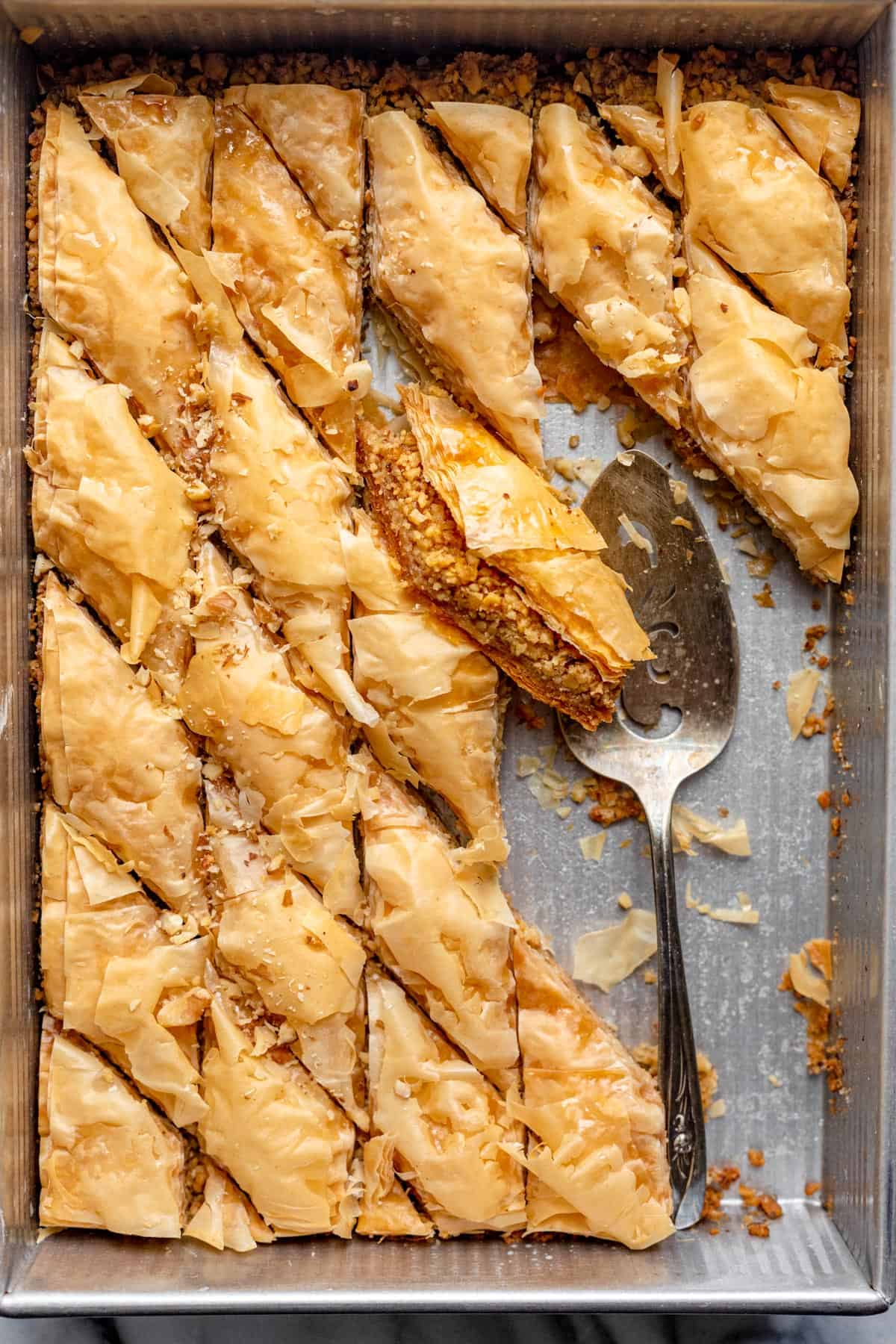
This version is very similar to how my mom used to make it growing up. However, through my researching and testing, I found an easy recipe for baklava with this simple pouring method I learned from Maureen Abood.
Instead of buttering each layer of phyllo, which is so time consuming, I pour the melted butter over the entire pan that’s been cut into. This is the secret tip for making the most efficient baklava recipe.
Baklava origin
From my research, it seems that the exact origin can’t really be pinpointed to one country. But in general it started in the Ottomon Empire by the Turks, then modified and popularized by Greeks and then spread throughout the Mediterranean region, with each country adding their unique twists.
What distinguishes Lebanese baklawa from others in different regions is the popular simple syrup we use in many desserts like Kanafa. We always get extra on the side whenever ordering Lebanese desserts!
Video tutorial for making baklava
Ingredients to make the recipe
- Phyllo sheets: Use the 9×14 package with one pound of phyllo split into 2 packages of 20 sheets.
- Clarified Butter or Ghee: While you might be tempted to just use butter, clarified butter is best in this case because it’s essentially the fat component of butter without the liquid part that can create a soggy baklava. You’ll get a more golden color and more crisp texture.
- Walnuts: Walnuts are traditionally used to make the recipe, but you can use other types of nuts like pistachios, which are very popular ingredient in Middle Eastern sweets.
- Sugar: I use cane sugar in most of my desserts, so that’s what I mix with the walnuts here. You can use regular white sugar or coconut sugar, but go for something granulated and not liquid for best texture.
- Simple Syrup: This is basically sugar cooked down with water to form a liquid sauce to pour over the baklava. We add lemon juice and orange blossom water to give it that unique Lebanese flavor. This simple syrup is the prime distinction of Lebanese baklawa from other variations.
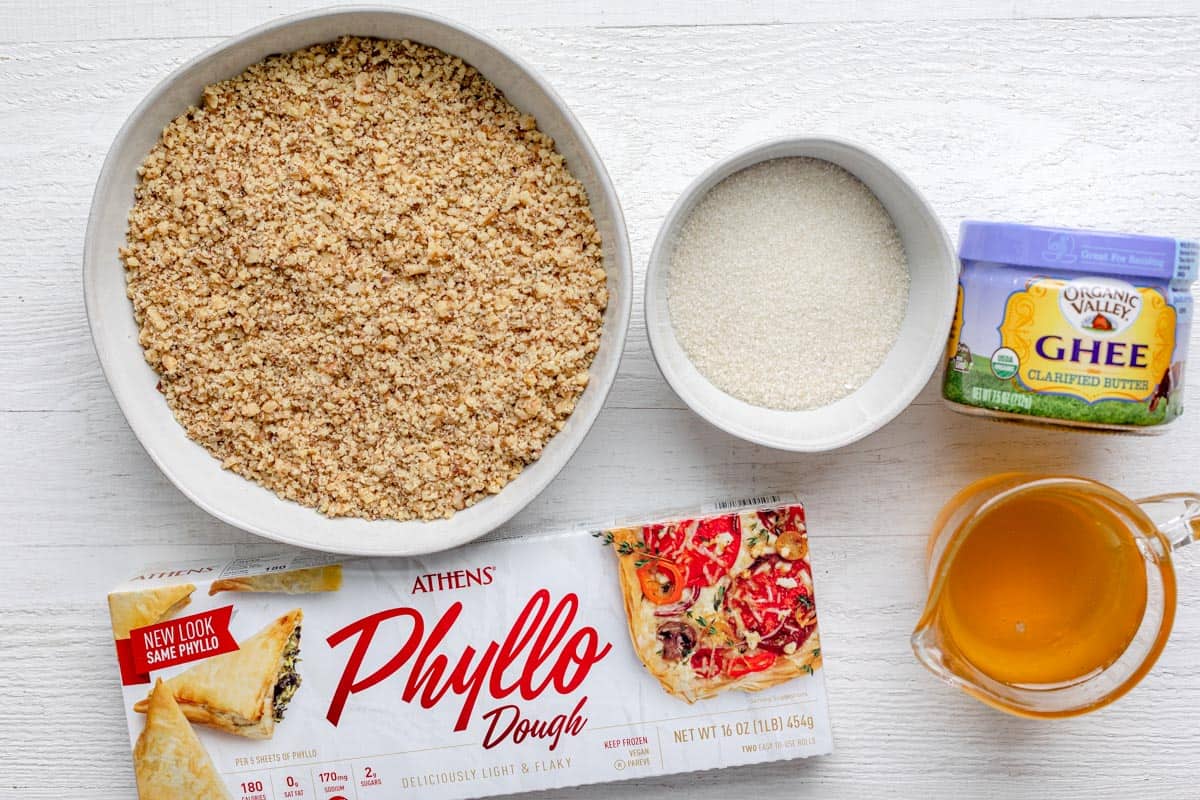
How to make baklava
- Place a layer of phyllo pastry sheets in the bottom of a prepared and greased pan.
- Add the mixture of crushed walnuts and sugar evenly on top, smoothening out with a spatula.
- Add the rest of the phyllo sheets carefully on top.
- Cut into diamonds and pour over the clarified butter. Bake.
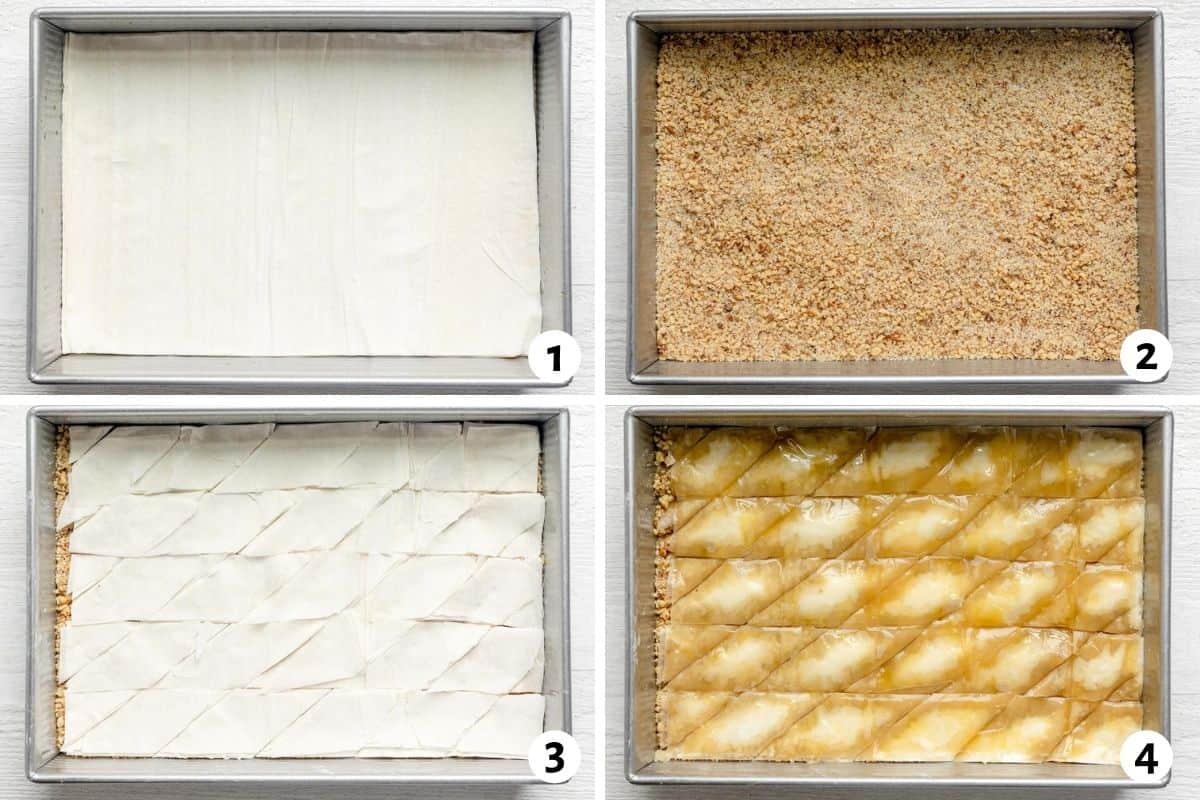
- When it’s done cooking, you have to make sure to drizzle the cooled simple syrup immediately! The cool syrup on top of the hot baklava not only creates the best crackling sound, but also help the syrup stick to the phyllo for the best texture and taste.
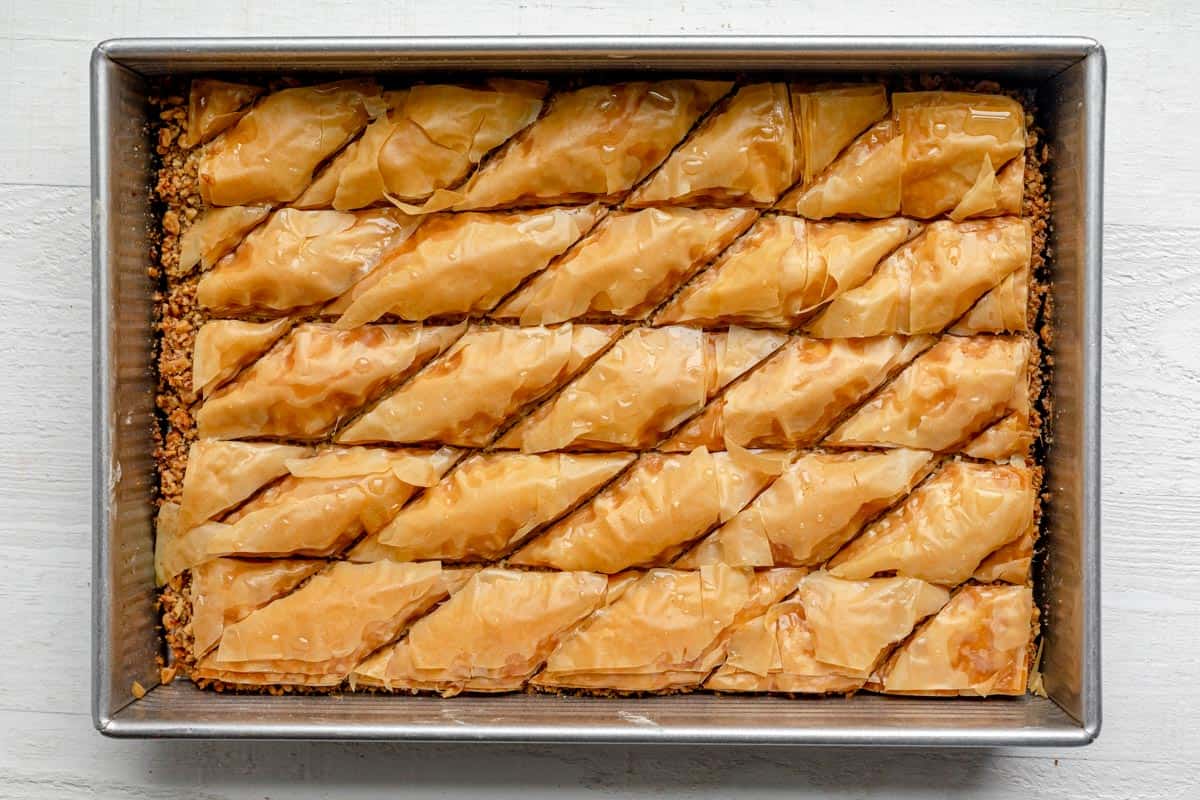
Tips for making the recipe well
- Trim the phyllo with a pizza cutter to fit properly in the pan. Keep in mind though that the phyllo will shrink as it bakes, so it’s ok to leave it just a little wider than the pan.
- Lay more phyllo sheets on the bottom layer than the top layer. It’s totally fine to keep them even, but splitting unevenly creates a more compact baklawa without as many crunchy fluttering sheets on the top.
- Make sure the top layer of the stack of phyllo sheets is not ripped for best presentation. It it gets torn accidentally, you can take a sheet from the center of the sheets and use as the top layer.
- Be sure to cut all the way through to the bottom of the pan. This is essential for allowing the clarified butter to seep through all phyllo layers. It’s important to have a super sharp chef knife for this process.
- Hold the knife downward when cutting into the stacked phyllo. I’ve learned this is the most efficient and clean way to cut through all those sheets.
- Keep the top layers of phyllo sheets down by lighting holding on to them while cutting into the phyllo stacks. The top layers will tend to lift as you make your way through cutting the lines, so be patient in this step.
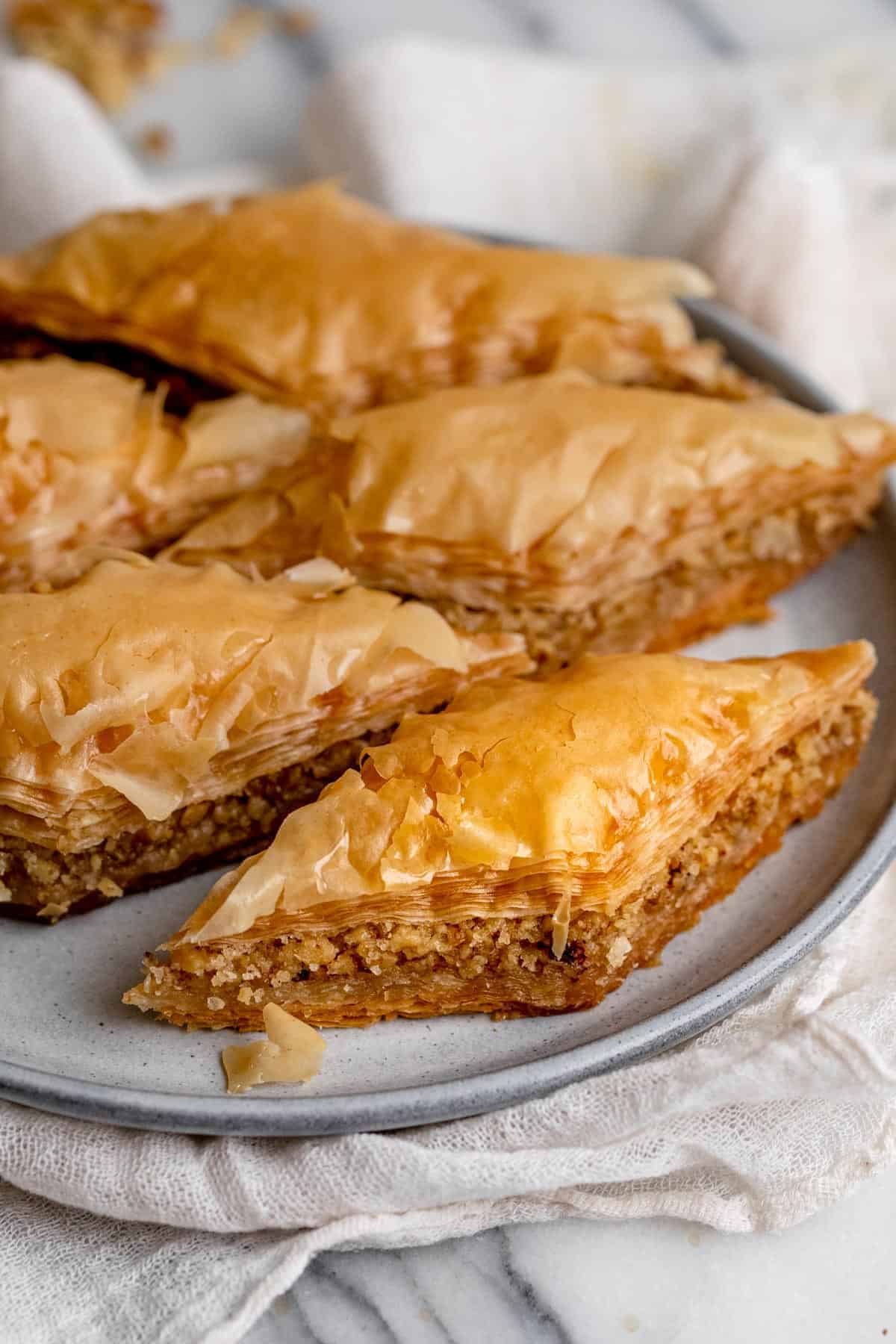
Frequently asked questions
Once you have made your walnut baklava, let it cool to room temperature. You can then lightly cover the tin with foil or parchment to store, or place the individual pieces into a container. You can store it in the fridge or at room temperature for up to 2 weeks.
Yes, this Lebanese baklava freezes really well, and it will keep for up to 3 months.Wrap the whole tin in plastic wrap and foil to freeze and thaw it at room temperature to serve.
Clarified butter is the best option when you make baklava as it helps to get the phyllo pastry perfectly crispy. It also has a much richer taste. You can buy clarified butter from the store, or make your own fairly easily. You can also use ghee. I’d definitely not recommend just using melted butter, it won’t have the same finish or flavor to it.
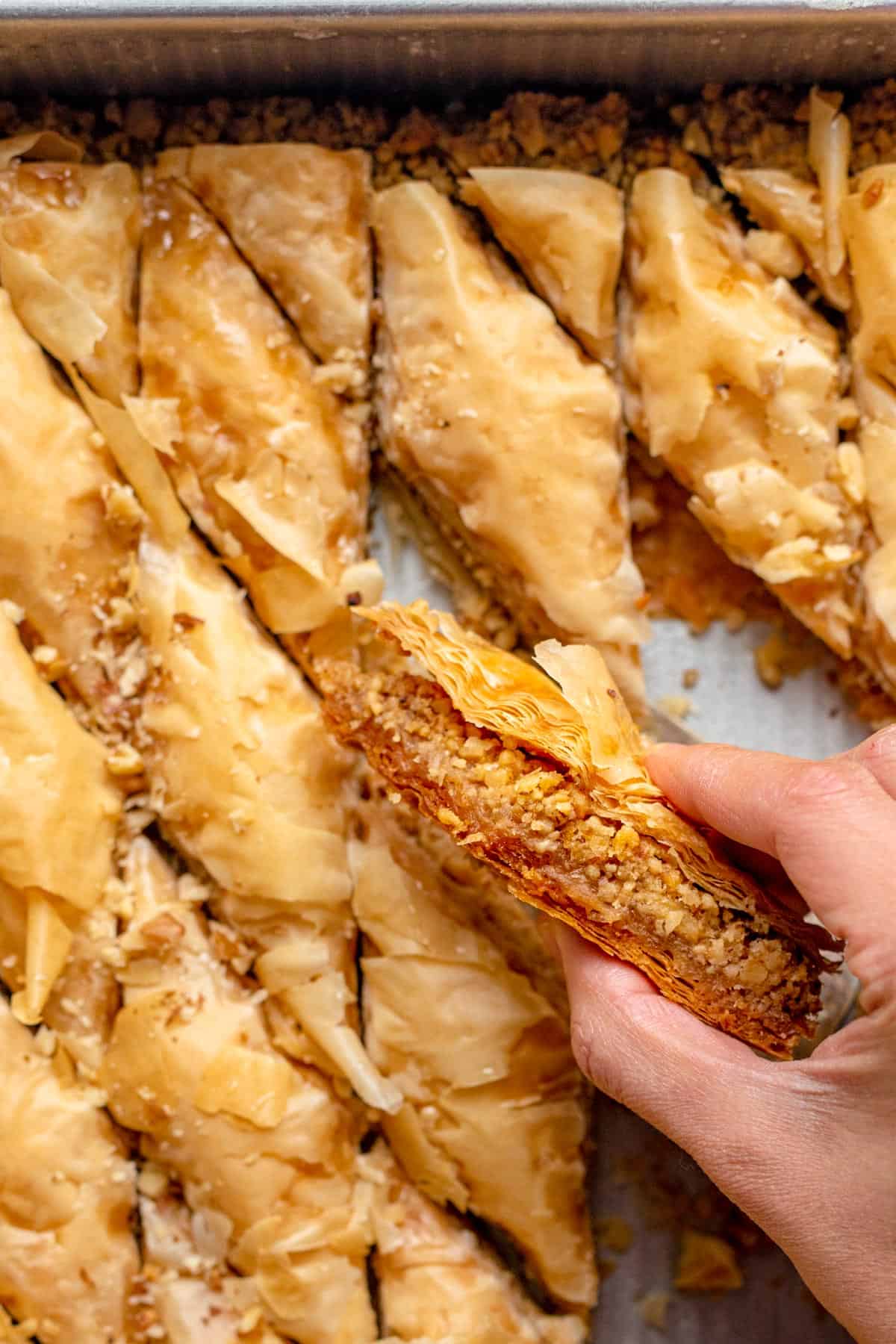
This is one of my favorite sweets to enjoy, it’s so rich and sweet and is a real treat! This new method I found worked so well, meaning that you can easily make a batch in the fraction of the time. I can’t wait for you all to try this flakey, buttery, irresistible version at home!
More Middle Eastern inspired desserts:
- Lebanese Kanafa
- Shortbread Cookies
- Date Cookies
- Pistachio Cookies
- Pistachio Butter Cups
- Almond Milk Rice Pudding
- Tahini Chocolate Chip Cookies
- Sfouf (Turmeric Cake)
If you’ve tried this healthy-ish feel good Lebanese Baklava recipe or any other recipe on Feel Good Foodie, then don’t forget to rate the recipe and leave me a comment below! I would love to hear about your experience making it. And if you snapped some shots of it, share it with me on Instagram so I can repost on my stories!
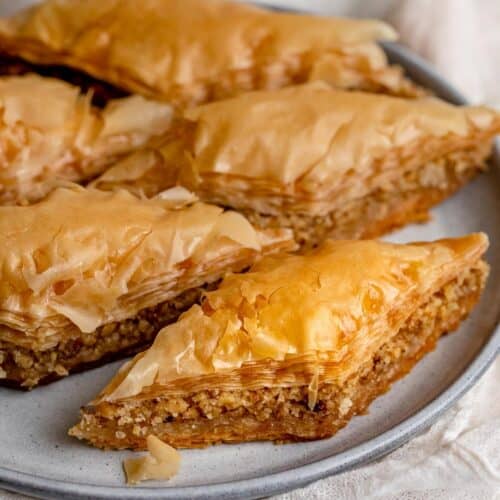
Lebanese Baklava
Ingredients
- 1 pound box of phyllo 9″x14″ sheets, room temperature
- ¾ cup clarified butter or ghee
For the Simple Syrup
- 1 cup granulated sugar
- ¾ cup water
- 1 tablespoon lemon juice
- 1 tablespoon orange blossom water
For the Sugared Nuts
- 3 cups raw or roasted walnuts coarsely chopped in food processor
- ½ cup granulated sugar
Instructions
- To make the simple syrup, combine the water, sugar and lemon juice in a small saucepan over medium-high heat. Bring mixture to a boil, then reduce heat to simmer, stirring occasionally until the sugar is dissolved and the mixture is thickened but still clear colored, about 5-7 minutes. Remove from heat, add the orange blossom water, and set aside to cool to room temperature.
- In a large bowl, combine the walnuts and granulated sugar until well mixed.
- Preheat the oven to 350°F. Brush the bottom of a 9 x 13 pan with clarified butter.
- Open the two sleeves of phyllo sheet – each will have about 20 sheets. Unroll them and cut off an inch at the end to make them fit into the 9 x 13 pan.
- Lay one stack of 20 phyllo sheets in the pan. Add about 5-10 more phyllo sheets on top of the first stack. Spread the nuts mixture over the phyllo in one even layer. Lay the remainder 10-15 phyllo sheets over the nuts.
- Cut the baklava into diamonds by making 4 cuts lengthwise and 9 cuts crosswise on the diagonal, holding down the phyllo sheets with your other hand as you cut carefully.
- Pour the melted clarified butter over the baklava evenly. Allow the butter to settle in, about 5 minutes.
- Bake until golden brown all the way into the cut lines, about 50-60 minutes, rotating the baklava halfway through baking.
- Remove the pan from the oven and immediately pour the cooled simple syrup evenly over the baklava. Allow to cool at room temperature for several hours before serving.
Notes
- Instead of walnuts, you can use other types of nuts like pistachios or pecans.
- Instead of cane sugar, you can use white granulated sugar.
- Instead of ghee, you can use butter, but I recommend clarifying the butter first.
Nutrition
Nutrition information provided is an estimate. It will vary based on cooking method and specific ingredients used.






Comments
Hello Yumna, I’ve just come across your recipe for the Baklava which I would like to prepare for this Sunday but I’m struggling to find Orange blossom water. Is there something else I can use? I live in Greece and it seems I would have to order it online. Thank you 🙏
Hi there! You can use rose water or a drop of orange extract. You can also leave it out altogether, if you’d like. Hope you enjoy!
Thank you so much for getting back to me so soon. I have one more question. I can’t seem to find the pan size that you have mentioned. They are all bigger or very small. What size could I use? Thank you once again.😊
No problem! Hmm, good question. What pan sizes do you have on hand?
Hi there, thank you for getting back to me. I found a tin that’s 36 x 25 cm and yours was 23 x 33. I hope it will be okay as I’m just starting to prepare it 🙏🤞
Oh, that should be just fine! It’s very close to the same size, that dish will definitely work. Hope it goes well!!
Warm thanks to you! ✨
You’re very welcome, Santiago!
I will watch my wife spending at least one hour making baklawa and I love the taste but she won’t make it for me whenever I want. So I found out this is the best and easiest way to make baklawa without buttering every phyllo dough sheet. I love it and share it with my church and they love it too, it is their favorite treat. Thank you for sharing it! May God bless you.
Aww, so happy you and your church love the recipe!! I agree, it’s so nice to have a version of baklava that’s delicious without being tedious. Thank you so much, Richard!
My Lebanese grandmother passed this recipe down to me before she passed, and I’ve made it a few times. Those who had hers said mine tastes exactly the same.
She advised buttering each phyllo layer, which it seems your recipe does not mention. I find that it keeps the balewa (as my grandmother pronounced it) much more moist.
I’m also curious if it makes a difference that we put the orange blossom into the pulverized walnut mixture rather than the drizzle. The flavor may be more dispersed when infused with the walnuts.
Hi Anthony, your grandmother made the baklava the authentic way by buttering each phyllo layer. That’s how it should be made and I definitely recommend doing that if possible. My method does not because I don’t have the patience for it personally and find that the shortcut is worth it because it still comes out incredible. I also love the idea of adding the orange blossom into the walnut mixture. I’ve heard that is very common too so either way works well! “Sahtain” as they say in Lebanon!
Thank you for your kind reply, it was great to hear back from you, and so quickly, too!
I believe buttering every two layers instead of each layer is a good compromise. Of course, one could adjust that anywhere between buttering every layer and none depending on personal preference.
I enjoyed reading your detailed recipe, it was nice to see an almost identical one to what I’ve learned. Mine was missing some details as I transcribed it from my grandmother, so I’ve integrated some of yours into it 🙂
See All Comments